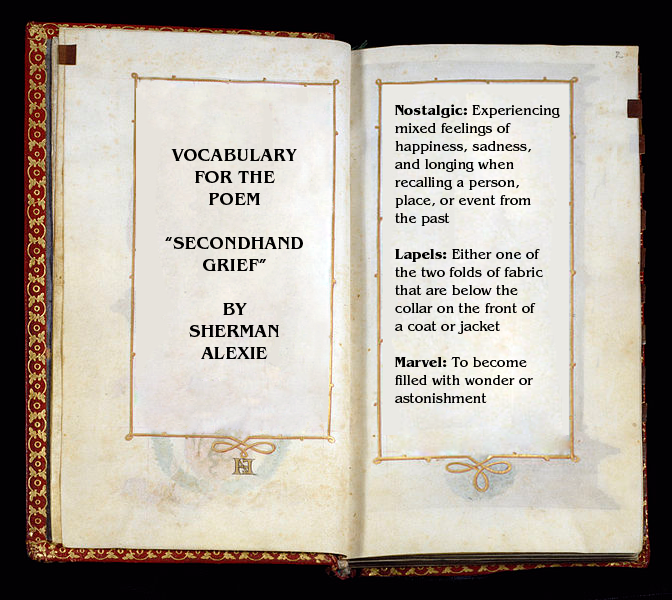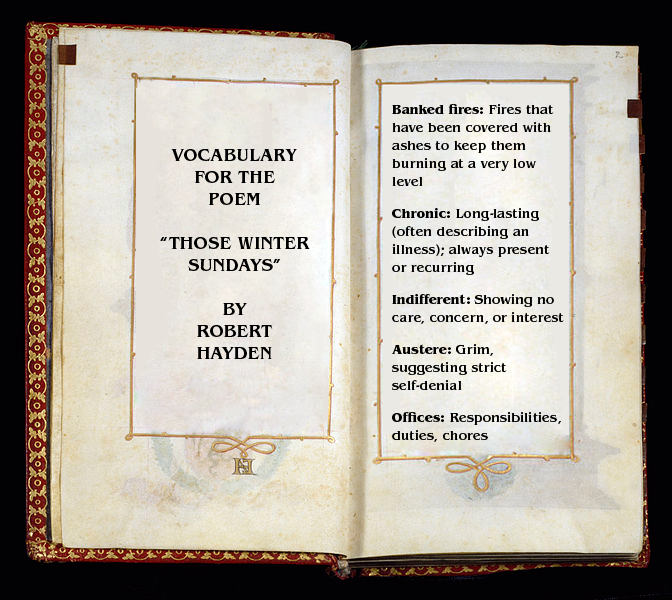Poets frequently use symbols because they are highly suggestive, yet can be established in a few words.
Three examples follow of symbols used in poetry. Click the “Next“ button beneath the box to scroll through the three examples.
Read the poem and the vocabulary below and think about the possible symbolic meaning of the father’s clothes. The vocabulary words below appear in red text in the poem.

Source: Master Jean de Mauléon - Leaf from Book of Hours - Walters W4491V - Open Group, Master John de Mauléon, Wikimedia
Secondhand Grief
After his father dies
The son wears his clothes.
First, the black shoes
Then the wool pants
and finally the blazer
with nostalgic lapels.
When he was a child
walking with his father
both of them wearing
identical suits and ties
the neighbors marveled
at how much they looked alike.
A thousand miles away
from his father’s grave
He steps into his favorite overcoat
and then steps outside
to walk among fathers
and sons, strangers
strangers, strangers
strangers, strangers
strangers, strangers
strangers, all of them.
The clothes (shoes, pants, blazer, and overcoat) are tangible. The son can see and touch them. On a literal level, the son inherited these items of clothing from his father. On a symbolic level, the son inherited certain qualities or traits from his father. Literally, he walks in his father’s shoes. Symbolically, he behaves or believes in ways similar to his father.
Even “a thousand miles away,” the son grieves among “strangers.” What might the stranger symbolize? According to Merriam-Webster, a stranger may be “someone who is unknown or with whom one is unacquainted,” “one who does not belong,” or a “foreigner.” The word “strangers” in Alexie’s poem might represent the son’s distance from his father in two ways: (1) literally, the son is a foreigner who doesn’t belong and lives “a thousand miles away from his father’s grave” and (2) symbolically, the son is a stranger, someone who was unknown to his father, even before his father died.
Alexie’s symbolism adds layers of meaning to “Secondhand Grief.” Even the son’s grief is not original. It is a “secondhand” grief felt by sons everywhere at the loss of their fathers.
The next poem you will read is by Robert Hayden. He uses symbolism in his poem “Those Winter Sundays” to show another relationship between a son and his father. The speaker in this poem is also an adult son.
In “Secondhand Grief,” objects (items of clothing) function as symbols. In “Those Winter Sundays,” you will see symbolic actions highlighted in the poem. For example, the father literally “got up early.” Pay close attention to the highlighted actions of both the father and son and think about their symbolic meanings. Now, read the poem and the vocabulary words below, which appear in red text in the poem.

Source: Master Jean de Mauléon - Leaf from Book of Hours - Walters W4491V - Open Group, Master John de Mauléon, Wikimedia
Those Winter Sundays
Sundays too my father got up early
and put his clothes on in the blueblack cold,
then with cracked hands that ached
from labor in the weekday weather made
banked fires blaze. No one ever thanked him.
I’d wake and hear the cold splintering, breaking.
When the rooms were warm, he’d call,
and slowly I would rise and dress,
fearing the chronic angers of that house,
Speaking indifferently to him,
who had driven out the cold
and polished my good shoes as well.
What did I know, what did I know
of love’s austere and lonely offices?
In the first stanza, Hayden focuses on the actions of the father before anyone else in the household awakes. In the second stanza, he shifts to the actions of the son. It is only in the last stanza that the father and son appear together and the son speaks “indifferently to him/who had driven out the cold.”
The actions in the poem are tangible. We read about the father and son performing literal actions as we read each stanza. Hayden, however, has also invested them with another, symbolic layer of meaning. In the exercise that follows, click on the box that best describes each symbolic meaning in the poem. Remember that the actions in “Those Winter Sundays” function as contextual symbols unique to this poem. These actions would probably not be symbolic if you read about them in another text.

The words symbol and symbolism are derived from Greek words meaning “to throw together.” A symbol creates a connection in the reader’s mind between an abstract idea and a specific object, scene, character, or action. In effect, a symbol substitutes for a concept. For example, the American flag stands for the ideals and unity of our nation. In poetry, symbols are created from persons, objects, places, actions, and situations. When symbolism is present, everyday words can extend beyond their usual identity to create additional levels of meaning.